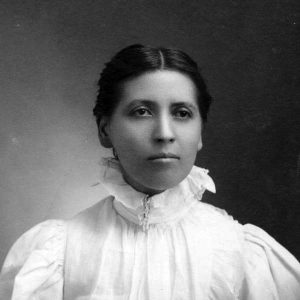calsfoundation@cals.org
Sallie Walker Stockard (1869–1963)
Sallie Walker Stockard was a historian, author, and frontrunner in the equality of women in education. Her book The History of Lawrence, Jackson, Independence and Stone Counties of the Third Judicial District of Arkansas is a valued source of early Arkansas history.
Sallie Stockard was born on October 4, 1869, in Alamance County, North Carolina, the oldest of six children of John Williamson Stockard and Margaret Ann Albright Stockard. Her father was a farmer, and her mother took in sewing to earn money to pay for their children’s educations.
Stockard entered Guilford College in Greensboro, North Carolina, in 1892, from which she graduated in 1897 with a BA degree. She was one of the first female students to enroll at the University of North Carolina at Chapel Hill. In 1898, she became the only one of the original group of five to graduate. This was her second BA degree.
In 1900, she received her MA degree from that same institution. Her thesis served as the basis for her first book, The History of Alamance, which was published in 1900. Two years later, she published, The History of Guilford County, North Carolina. She furthered her education by attending Clark University in Worchester, Massachusetts. In 1903, she published her third book, The Lily of the Valleys, a dramatization of the Song of Solomon in five acts.
In 1904, Stockard ventured to Independence County, Arkansas, and wrote The History of Lawrence, Jackson, Independence and Stone Counties of the Third Judicial District of Arkansas. This book, often referred to as “The Arkansas Book,” was one of the earliest regional history books to be researched locally and to quote the pioneers extensively.
Her guide for the research project was a recent widower, Perry Green Magness, whose family had lived in that area for almost 100 years. The couple married in September 1904 in Batesville (Independence County). In April 1905, she conducted the Cambridge School for young ladies at their home near Magness (Independence County). Shortly after that, their son was born.
Around 1908, the family moved near Clovis, New Mexico, and their daughter was born in 1909. Within a couple of years, the couple separated, but they apparently never divorced. Stockard used her maiden name, a practice she followed most of her life—although a few times, she was referred to as Sallie Stockard-Magness. She received a teacher’s license and taught near Roswell, New Mexico. She later lived in parts of Texas and Oklahoma working variously as an educator, housemaid, and cook.
By the early 1920s, Stockard moved to New York City, where she enrolled in Columbia University’s Teachers College and earned her second master’s degree in 1924. She later settled on Long Island, New York.
Around 1940, she founded and published a community newspaper, the Nassau Golden Fleece News Gleaner. She later moved to Florida, where she lived in semi-retirement for some time, working part of that time as a housekeeper and cook.
When she was about seventy years old, Stockard penned her yet-to-be-published autobiography titled, “Daughter of the Piedmont: Chapel Hill’s First Co-Ed Graduate.”
Stockard later moved back to Long Island. She died on August 6, 1963, and is buried at Greenfield Cemetery in Hempstead, Long Island.
For additional information:
Coates, Albert. By Her Own Bootstraps: A Saga of Women in North Carolina. Chapel Hill, NC: 1975.
Craig, Robert D. “Sally Stockard: Early Independence County Historian.” Independence County Chronicle 53 (Summer 2012): 2–15.
Stockard, Sallie Walker. “Daughter of the Piedmont: Chapel Hill’s First Co-Ed Graduate.” Ed. Ione Magness Kilmer. Greensboro Historical Museum, Greensboro, North Carolina.
Stockard, Sallie Walker. The History of Lawrence, Jackson, Independence and Stone Counties of the Third Judicial District of Arkansas. Little Rock: Arkansas Democrat Co., 1904.
Troxler, Carole W. Sallie Stockard and the Adversities of an Educated Woman in the New South. Raleigh: North Carolina Office of Archives and History, 2021.
Robert Craig
Kennett, Missouri
 Sallie Stockard
Sallie Stockard 



Comments
No comments on this entry yet.